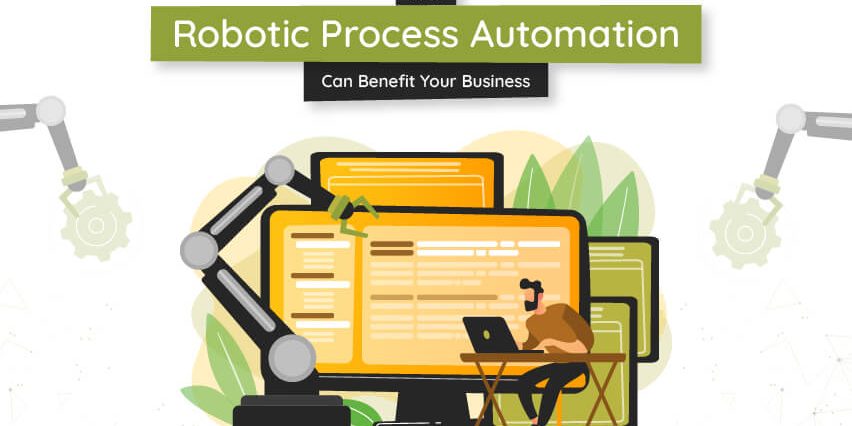In today’s rapidly evolving business landscape, organizations are constantly seeking innovative solutions to streamline operations, boost productivity, and drive growth. Robotic Process Automation (RPA) has emerged as a game-changer, offering a plethora of business benefits that can revolutionize the way companies operate. In this blog post, we will explore the transformative power of RPA and delve into its significant business advantages, paving the way for enhanced efficiency, cost savings, and improved customer experiences.
RPA in Business Environment
Recent corporate research on finance and accounting professionals suggest that the implementation of RPA is becoming crucial. It is the most effective way to eliminate repetitive, manual and time-consuming processes. The corporate data is increasing continuously and companies are facing challenges in gathering and analysing big data. With improved efficiencies of the work, automation can provide real-time access to the data to the required personnel. Moreover, more accurate intelligence data, analytical and reporting capabilities are also possible. RPA in a corporate environment adds value to business operations. It has already revolutionized many businesses including health care, finance, retail and marketing as well.
Potential Business Benefits of RPA
The main aim of RPA is to rationalize the internal process of the business, where technology and people work together in harmony. It also enables better insight into opportunities and trends for the business. The benefits of using RPA that can automate and digitize business operations are as follows.
 Enhanced Operational Efficiency
Enhanced Operational Efficiency
One of the primary benefits of RPA is its ability to significantly enhance operational efficiency within organizations. By automating repetitive, rule-based tasks, RPA liberates employees from mundane and time-consuming activities, allowing them to focus on higher-value strategic initiatives. With software robots executing routine tasks swiftly and accurately, businesses can achieve increased productivity, reduced error rates, and accelerated processing times. RPA empowers employees to allocate their time and expertise towards more critical responsibilities, driving overall operational excellence.
Mitigation of Errors and Risks
The tasks done manually by humans consist of many mistakes. But through Robotic Process Automation, business operations become error-free and the probability of risk is reduced. The system has the potential to work 24/7 without taking any breaks which not only enhance the efficiency of the work but also reduce errors. Moreover, the integration of RPA in business is economical and it easily integrates with existing IT systems.
Immediate Outputs
RPA increases the speed of business operations. This is because RPA solves customer queries quickly and provides immediate outputs. Moreover, RPA increases processing time and delivery time. Besides, RPA follows accurate and valid regulations to perform the task, hence provides immediate outcomes.
Quality Data
RPA helps in reducing the quality of data and the probability of manual. Hence, an organization expects an increase in the quality of the data. Data analysts like you and me analyze the collected data, while RPA helps and facilities to do it more effectively. RPA generated reports help analysts to further generate appropriate decisions. Hence, RPA helps in maintaining a good quality of the data with the least number of errors.
Reduced Workload
Employees usually become tired and exhausted due to an increase in the workload. Utilization of RPA reduces the workload of the employees and decreases their stress. This increases the overall productivity of the workforce. Moreover, RPA also eliminates the repetition of tasks. Hence, RPA helps in maintaining smooth workflows and reduces employee’s stress.
Compliance Benefit of RPA
One RPA in the business has reduced the involvement of humans in businesses. RPA helps to decrease the possibility of compliance issues, fraud, discrepancies and many other fraudulent activities. RPA further facilitates the business to gain benefits and achieve compliances associated with the business name successfully.
Satisfied Employees
RPA helps to manage manual tasks more easily. This enables the employees to focus on more challenging, exciting and creative task along with gaining satisfaction towards the job.
Some of the revolutionized industries and businesses using RPA include telecommunication, retail, utilities, finance, insurance agencies and banks. To increase the overall performance of the firm, companies must invest in Robotic Process Automation.
Use Cases of Robotic Process Automation
Automation increases the productivity of employees and gives them extra time to focus on connecting with customers and business growth. Following are some potential use cases of RPA.
- It helps IT departments in the firm in provisioning new users.
- It helps HR in boarding new employees
- In the organization’s account payable department, it helps in invoice processing.
- It helps sales and marketing team in creating and updating new entries for potential leads.
Final Word
RPA is becoming a crucial need of the business; it allows the firm to become more efficient. It helps to automate front-end and back-office operations that are time-consuming, manual, repetitive, thus enabling employees to concentrate on tasks that require decision-making, judgment, and creativity. All in all, Robotic Process Automation will become a necessity by the end of this decade.
If you need any help implementing RPA for you business. Try our RPA Consulting Services
Other Related Articles You Might Be Interested In
Leveraging RPA to Drive Efficiency
Automation in Mortgage Processing







